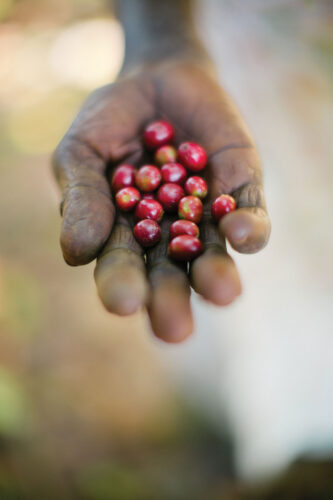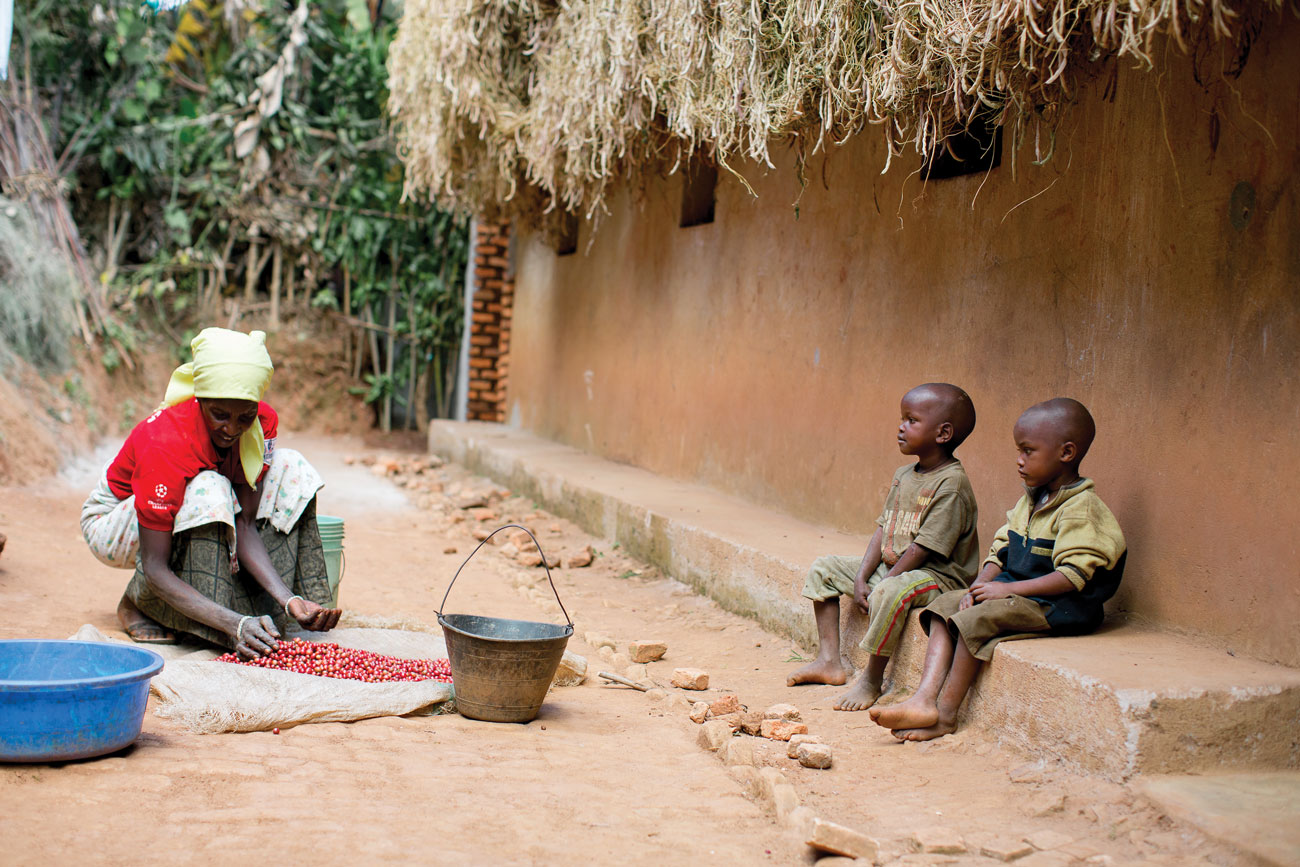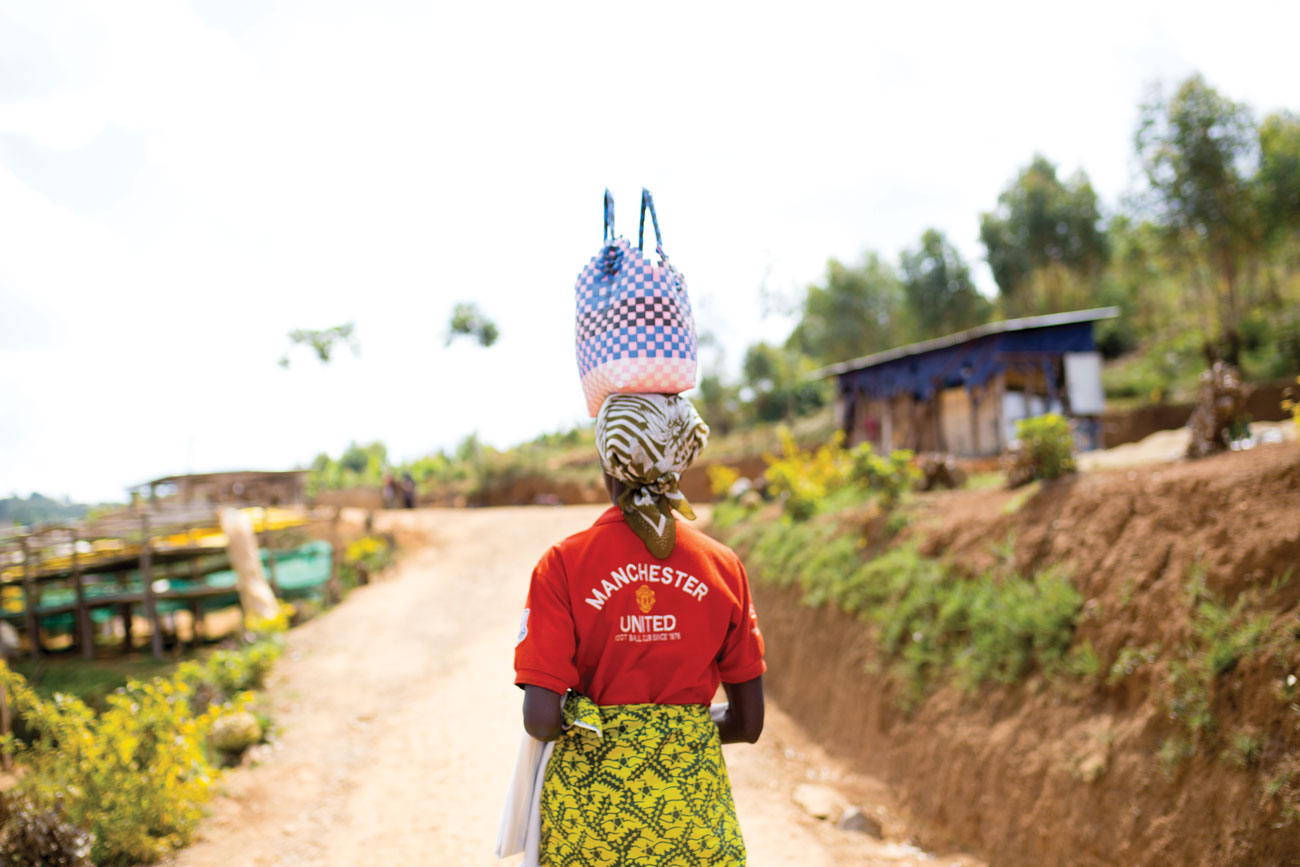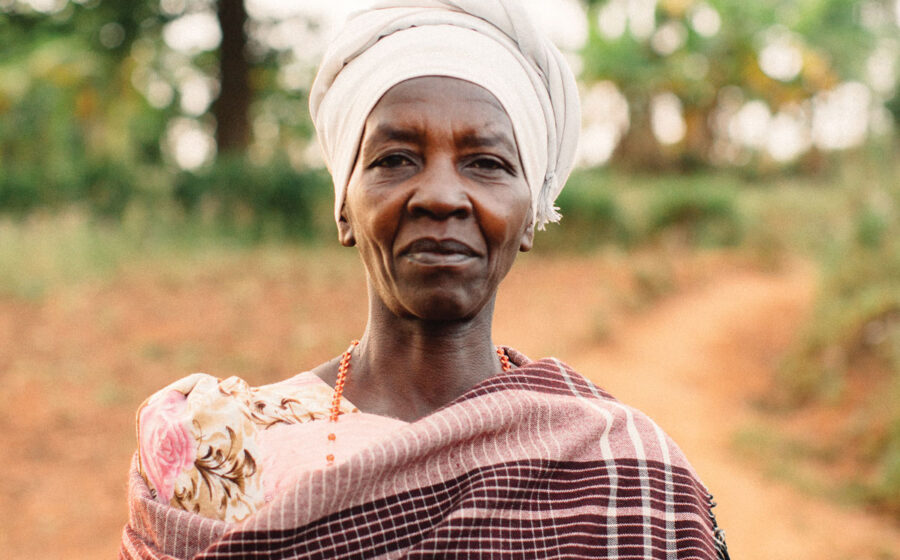[T]he smell of animal dung and crisp eucalyptus leaves hangs thick in the air and a wet, dark mist slides low along dirt roads. Dawn is only moments away in the small East African country of Burundi, the purple glow of it determined to stamp out what remains of the night. I am already on the road, my old Land Rover Defender coughing in protest at our early start. We cross a pothole-laden stretch of earth, coffee trees in the rear view mirror, in search of the home of a coffee and tea farmer named Mama Claude. I wonder how we will connect, what common ground will we find? I’m a white woman from the Midwest born into a middle class family. Back in the days when I was complaining about doing the homework that came along with my free education, she was surviving a war and navigating poverty.
Just as the last of the darkness has lifted, I arrive at Mama Claude’s with my son, our office manager at Long Miles Coffee Project, Alice, and our agronomist, Epapharus, whose heart is far larger than his stature. She bursts out of her small brick home, arms outstretched, exclaiming that she never expected me to actually come. We laugh, and the act of it pushes against our cultural divide, instantly shrinking it. Two sons lean against a rough wooden doorway of teal blue, their bare feet pressed into the cool of the cement floor. I smile and they don’t smile back. Mama Claude notices and moves her sons my way for an introduction. There is a manner about Mama Claude that instantly puts me at ease; it seems to me she is made up of equal parts fearlessness and openness.
I ask her if she has eaten yet because I am eager to see her cooking process. Mama Claude explains to me that her family never eats a morning meal. They can’t afford to. I drop my eyes in thought, remembering that I woke up extra early to be sure I had a good breakfast and some decent coffee. When will you eat? I ask. Not until three p.m., she says. And then? Not until the following day at three p.m.
There is a manner about Mama Claude that instantly puts me at ease; it seems to me she is made up of equal parts fearlessness and openness.
Farmers in Burundi cultivate several crops in order to make ends meet. When you meet a Burundian coffee farmer you are also meeting a Burundian tea, bean, corn, or sweet potato farmer. Mama Claude has a tea field and a plot for beans, as well as 500 coffee trees. She is responsible for farming it all, as her husband lives and works over an hour away in the capital city. It only seems fair that I should put my breakfast to the test.
It’s time to pick some tea. We walk for thirty minutes over dirt paths that have been packed to a red-brown sheen by feet before us. Mama Claude rotates her days between her fields, harvesting coffee in the afternoon and tea in the morning, or tea one day and coffee the next.
Once we arrive at Mama Claude’s tea field, she gives me a quick lesson in how to pick tea. Three leaves only and if it isn’t picked to exact specifications the buyers will reject her whole day’s labor. She chuckles at me when I challenge her to a tea-picking duel. My team of three against her team of one, the first to fill a bag wins.

Mama Claude is fifty-seven and has farmed this tea field with eleven different babies on her back, all of them hers. She tells me that my two boys are not enough; I must have more children especially because I pick tea so slowly. At least I’m raising them in Burundi, that she says I’m doing right. Her humorous and gentle jabs are like a revival for my hands. Standing in a waist high sea of green, we laugh. I look down at the beautiful cloth igitenge she has given me to wear while working. I am intrigued by her thoughtfulness and by her story, so the questions tumble. How did she meet her husband?
In 1974 a student named Concilie Nzikobanyanka fell in love and at just sixteen, she dropped out of school and chose marriage over schoolbooks. Her parents disapproved and tried hard to stop her, but Concilie was determined that a love like hers was worth it. Concilie became Mama Claude with the birth of her first born son. As in many African countries, she took the name of her first born son. Are you happy now with your choice to forgo school, I ask. She shoots me a tough glance, “We need to live without regretting our choices. Do you see me lacking anything?” I can think of a few things I would complain about if I were her—like a lack of electricity and running water.
The sun pounds down on foreheads and tea fields alike. I take a water break to rest my fingers and think about how much I have and that I have not stood up recently and said, “Do you see me lacking anything?”

In the year that Mama Claude gave birth to her second child in her dirt-floored home, I was born into the gold shag carpeted world of the snowy Upper Midwest in the late 1970s. I was drawn to the idea of building a life in Africa from a young age. It was just one of those things, a place that felt like home from the time I was ten, even though I didn’t step onto its shores until I was nineteen. Once I did make it to Africa, I let the glow of it seep into my bones and never really considered building a home anywhere else. That was fifteen years ago. Now, watching the morning sunlight flare behind Mama Claude’s silhouette and hearing her rich laugh reverberate across the hills, I feel more at home in Burundi than ever before.
Home really can be a journey in itself. Two years ago my small family became coffee producers when we built a washing station (wet mill) on a rural hillside in the heart of one of Burundi’s best coffee producing regions. Coffee trees belonging to Mama Claude line part of the road to our washing station, her home with it’s banana leaf walkway stands less than a half a mile from the Long Miles washing station. Oswald, who is nineteen and one of Mama Claude’s eleven children, is part of a team of “coffee scouts” that we’ve trained to search for and capture the antestia bug. The antestia bug destroys coffee seeds by boring a hole through the coffee cherry, which protects the seed or “bean” as it will later be called. Drilled with perfectly round precision, antestia bug boreholes expose the coffee seed to bacteria, which is believed to be the source of the dreaded potato defect that wracks our region.
My hands are tired and raw with my whole back throbs with ache, while a woman over twenty years my senior continues on with what seems like absolute ease.
Now under the haven of Mama Claude’s coffee trees, we make crunching steps across dry mulch beds of banana leaves. It’s nearing the end of the coffee season, and with the close of the harvest season comes the dust of the dry season. This year, the end of the seasonal rains stopped Burundi’s bumper harvest in its tracks. Without rain, stunted coffee cherries hang hard and brown on trees, a relic of what could have been. There are still a few ripe cherries ready for harvesting, those that matured before the rains stopped, and a dull repeating thunk sounds from beneath the trees as small handfuls of them hit the bottom of a plastic pail. These trees are worn and old, they are reaching for the sky and almost get there. Like most of Burundi’s coffee trees they are in need of both pruning and fertilizer. Mama Claude’s youngest sons are helping with harvest and they threaten to pop the plump coffee cherries in their mouths. Mama Claude scolds them for thinking of it. They laugh and keep harvesting. These cherries, no matter how good they are, are not for eating.
Supporting Britain’s beloved football team, Mama Claude wears a Manchester United shirt with pride. We talk about her love of soccer as we pick cherries in the afternoon heat. In her small mud brick home there are images of soccer players plastered loudly over bare stucco walls. When I sat on her couch, a firm wooden structure with no cushions that’s made in the curvaceous Burundian fashion, I couldn’t help but stare long and hard at the image of a fierce Manchester United player kicking a ball and dripping with sweat. Illuminated by the only source of light, the open door and the daylight beyond it, he looks surreal frozen mid-kick on Mama Claude’s wall.

There are branches and leaves caught in my hair from trying to dip low under brittle coffee trees. Mama Claude laughs at me, I don’t do anything with her finesse. My hands are tired and raw and my whole back throbs with ache, while a woman over twenty years my senior continues on with what seems like absolute ease. She smiles at me sitting in the mulch, feigning a camera lens change, “When you are exhausted, you can’t just opt out of life here. You have to learn to persevere. Who else will harvest this field? There is no one but me.” I think about how true that is.
With a meager harvest we return to Mama Claude’s home. Water is pumped from a nearby well and poured over dusty coffee cherries. Hands stir and the cherries glisten. Those that float to the surface are removed, rejected from the day’s harvest. With care, Mama Claude pours the coffee cherries into a bright blue basket to take to the washing station. We walk the short distance from her house to the washing station, laughing about the day as a herd of goats passes by.
I touch the blood blisters on my fingers. They serve as reminders to me of a woman coffee farmer whose humor and gratitude have connected me to Burundi and my life here in new ways. By everyone’s accounts Mama Claude lives well below the poverty line. She has very little, to be sure, and she is respected and admired by those in her community. She is a leader, a problem solver, a friend, a mother, and a coffee farmer. Now, whenever I travel the dirt road connecting the village of Bukeye to our washing station, I can’t pass by her blue front door without shouting, “Mama Claude ari hehe?” (Where’s Mama Claude?) to one of her neighbors. One day she was helping a friend harvest beans. Another day she was fertilizing her coffee trees. On yet another day she was cultivating her fields for potatoes. The answer is never the same but one thing is certain, Mama Claude is out in a field somewhere in Burundi farming with courage, wisdom, and a hefty dose of humor.
—Kristy Carlson works and lives in Burundi where she and her husband, Ben, grow coffee, manage a washing station, and help connect farmers to roasters through the Long Miles Coffee Project.

















